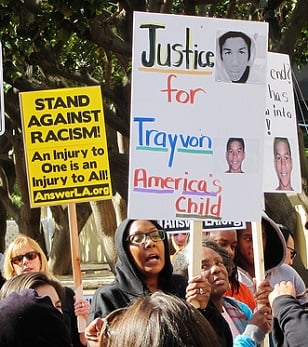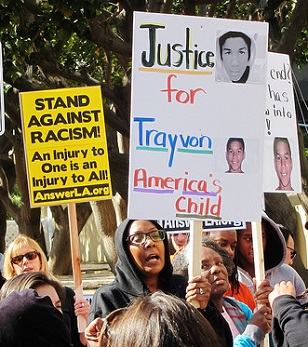Honest, paywall-free news is rare. Please support our boldly independent journalism with a donation of any size.
 Calvin Fleming / Flickr)” width=”308″ height=”347″ />Trayvon Martin – Million Hoodies March 2012. (Photo: Calvin Fleming / Flickr)My heart goes out to the parents of Trayvon Martin. It also goes out to everyone committed to social justice and human dignity.
Calvin Fleming / Flickr)” width=”308″ height=”347″ />Trayvon Martin – Million Hoodies March 2012. (Photo: Calvin Fleming / Flickr)My heart goes out to the parents of Trayvon Martin. It also goes out to everyone committed to social justice and human dignity.
I share the lamentation of every black person in the United States who faces a society that in effect makes every non-black person, and especially every white person, a deputy of a state committed to keeping us in our so-called “place.” W.E.B. Du Bois warned us of this back in 1903 in The Souls of Black Folk when he wrote:
…its police system was arranged to deal with blacks alone, and tacitly assumed that every white man was
ipso facto a member of that police. Thus grew up a double system of justice, which erred on the white side
by undue leniency and the practical immunity of red-handed criminals, and erred on the black side by
undue severity, injustice, and lack of discrimination. For, as I have said, the police system of the South was
originally designed to keep track of all Negroes, not simply of criminals; and when the Negroes were freed
and the whole South was convinced of the impossibility of free Negro labor, the first and almost universal
device was to use the courts as a means of re-enslaving the blacks. It was not then a question of crime, but
rather one of color, that settled a man’s conviction on almost any charge. Thus Negroes came to look upon
courts as instruments of injustice and oppression, and upon those convicted in them as martyrs and victims.
The history of such sequestering has always been a violent one. We know this from the days of lynchings to the continued police-managed racist state, where, for young black males, contact with the latter is often in the form of facing a badge shining in front of a pointed gun. So it continues to be.
Marissa Alexander, a black woman, was sentenced 20 years for attempted murder for shooting two warning shots when facing a husband who was threatening her.
George Zimmerman, first presumed white, then Latino, then half white, and so on, stalked Trayvon Martin, a black 17-year-old, ignored 911 counsel to discontinue his actions, confronted Martin, was in an altercation with him, fatally shooting him in the heart, and—wait a minute—was acquitted on the grounds of self-defense last Saturday?
We have some clarity on the “stand your ground” law in Florida: do so as long as you are not black.
What, after all, was Trayvonn Martin doing but standing his ground? He had committed no crime. Had he perhaps had a gun and shot Zimmerman when he accosted Martin, he would at least been alive. But given the double standards of justice, he also would no doubt have been convicted of what Zimmerman should have been found guilty.
Rendering Zimmerman “not guilty” is a denial that Zimmerman actually committed a crime in slaying a black youth. And, indeed, the whole case ultimately came down to the slain Martin being convicted twice: first, to death for protecting himself against Zimmerman, and, second, to deserved death for having committed the first.
Juror B37 claims race has nothing to do with Zimmerman’s acquittal.
She—since all of the jurors were female—seems to forget that the entire trial was televised. Evidence and testimony were, in other words, public.
This meant that a basic element of criminal trials—Is the accused guilty beyond a reasonable doubt?—was clear to many and not met for others. A whole lot of the world who viewed the trial stand in the camp of the former.
What, however, is “a reasonable doubt” in a world where black men simply sharing elevator space with whites, especially white women, is considered threatening? What is it when simply appearing in many people’s visual field or simply asserting oneself as deserving of respect is considered being “uppity” a threat?
One of the things it means is that to be black is to be on trial. There thus wasn’t a George Zimmerman trial these past several weeks. It was a Trayvon Martin trial. And since to be black is to be presumed guilty, the rest, as we say, follows.
Yes, we saw the evidence, heard the testimonies, saw the facts. We are to believe that a white-looking man with a skinhead haircut, a goatee, dressed for a confrontation, approaching a 17-year-old black male on a February night, needed to be protected against that black teenager walking home after purchasing some skittles—that is,a youth engaged in no criminal activity.
“Race” supposedly had nothing to do with the verdict.
Really?
—REALLY?
Let us imagine the same scenario without any racial markers.
A man decides he will do the crime watch for a gaited community, which, by the way, never asked him to do such. He sees a tall young man in a hoody walking. He follows him in a car for some time and calls the police. They ask if the man has done anything, and the answer is simply that the crime watcher has never seen him there before. The police tell the crime watcher not to continue pursuing the young man. He ignores them, gets out his car, and confronts the man in the hoody. They get into a scuffle, and the crime watcher shoots his opponent. A 17-year-old who had committed no crime, who was in the process of walking home during half-time of watching the Basket Ball All-Star Game, lay dead.
What most people would ask is this: Why did the crime watcher ignore the police recommendation? Why, even in the scuffle, did he shoot the youth in the heart? Why did he shoot him at all? Usually taking out one’s gun is sufficient to do the job.
Let’s add to this scenario. The police don’t charge him. They eventually do, however, under public pressure.
The prosecutor entrusted to try the now accused crime watcher faces a dilemma. If this person were found guilty of criminal homicide, whether 2nd degree murder or manslaughter, what would that mean for the behavior of the agents of law enforcement in his county? Should not an outside prosecutor have been brought in?
Even with that, wouldn’t a similar problem emerge in the case of a guilty verdict, since the agencies bringing in the external prosecutor then have to put the law enforcement agencies themselves on trial?
The first scenario reveals this: Even without considering race—a verdict of acquittal would be the wrong verdict.
If that is correct, it means, then, if race had nothing to do with the matter, then the verdict would have been otherwise. As it was not otherwise, that means, then, that race had a great deal to do with the matter.
It was not only race but also racism that had everything to do with Zimmerman’s acquittal. It helped Zimmerman because it stimulated the effort to prove that the homicide and the authorities’ response to it were supposedly not racially motivated or governed by racial prejudice.
Zimmerman could not have asked for a better, over-determined situation: a prosecutor, a defense attorney, and a jury determined to prove themselves free of racial prejudice.
This, in truth, is one of the main problems of American racism: it protects itself through denying the legitimacy of identifying its presence. Race supposedly cannot be a factor because it is an attribute of the bad guys, and “we,” by which I mean the nation and its institutions, are supposedly the good ones.
This was a trial watched across the globe. What many Americans don’t seem to understand is that many want America to be better than it is. Especially with its highest office represented by a man of color. They want to believe that everyone can receive justice here. What, however, if Zimmerman were found guilty?
That would mean that going around stalking black youth, killing them, and claiming self-defense would hold little weight in America. I say “little” because it could also mean that this one instance would be used to exonerate so many other incidents, such as the injustice waged against Marissa Alexander. It would also mean that a black person’s life actually matters.
Such, however, was not achieved.
The state went through the motions, placed Trayvon Martin on trial, and now faces the question of whether it—at least the criminal justice system in the State of Florida—could sustain the force of federal investigation. The world is watching. Justice might come to America some day, just as democracy might, as the late Manning Marable once hoped, but it could only do so, at least with this problem of unjust justice, through admitting that racism has nearly everything to do with it.
Trump is silencing political dissent. We appeal for your support.
Progressive nonprofits are the latest target caught in Trump’s crosshairs. With the aim of eliminating political opposition, Trump and his sycophants are working to curb government funding, constrain private foundations, and even cut tax-exempt status from organizations he dislikes.
We’re concerned, because Truthout is not immune to such bad-faith attacks.
We can only resist Trump’s attacks by cultivating a strong base of support. The right-wing mediasphere is funded comfortably by billionaire owners and venture capitalist philanthropists. At Truthout, we have you.
Our fundraising campaign is over, but we fell a bit short and still need your help. Please take a meaningful action in the fight against authoritarianism: make a one-time or monthly donation to Truthout. If you have the means, please dig deep.
